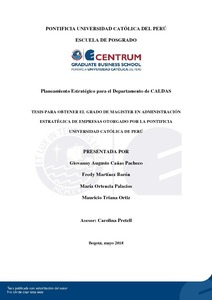| dc.contributor.advisor | Pretell Pardo, Ángela Carolina | |
| dc.contributor.author | Cañas Pacheco, Giovanny Augusto | es_ES |
| dc.contributor.author | Martínez Barón, Fredy | es_ES |
| dc.contributor.author | Palacios, María Ortencia | es_ES |
| dc.contributor.author | Triana Ortiz, Mauricio | es_ES |
| dc.date.accessioned | 2018-07-30T23:25:17Z | |
| dc.date.available | 2018-07-30T23:25:17Z | |
| dc.date.created | 2018 | |
| dc.date.issued | 2018-07-30 | |
| dc.identifier.uri | http://hdl.handle.net/20.500.12404/12365 | |
| dc.description.abstract | En el presente trabajo se hace un análisis del departamento de Caldas en todos sus
ámbitos con el fin de identificar formas para el mejoramiento social, económico y ambiental
de la región (por medio del diseño de estrategias de desarrollo). También se pretende, a través
del plan estratégico, consolidar al departamento de Caldas como líder en competitividad a
nivel nacional y latinoamericano, para así mejorar el nivel de vida de sus habitantes
llevándolos a estándares cercanos a los de los países desarrollados. El plan estratégico
desarrollado en el presente documento fue elaborado en función al Modelo Secuencial del
Proceso Estratégico. Éste se compone de un conjunto de actividades que se desarrollan de
manera secuencial con la finalidad de que una organización pueda proyectarse al futuro y
alcance la visión establecida y el análisis del material se realizó a través del estudio analítico
descriptivo.
Caldas es un departamento altamente competitivo, éste se ubica en el tercer lugar a
nivel nacional, con grandes fortalezas que debe mantener, como son sus instituciones
públicas, la alta calidad de la educación superior, la eficiencia de los merados e innovación,
pero con oportunidades principalmente en factores básicos como infraestructura y salud. A su
vez, Caldas posee cuatro clústeres que lo hacen más competitivo (metalmecánico, tecnologías
de la información, innovación y creatividad, textil). Además, se han identificado dos clústeres
potenciales (el turístico y el agroindustrial). Por último, el análisis competitivo permitió
confirmar la elección adecuada de los OLP que ayudarán a lograr la visión de mejorar la
competitividad del departamento.
En cuanto al Plan Estratégico Integral (PEI), presenta las partes esenciales del proceso
de planeación estratégica. Su importancia radica en que de forma rápida permite a todos
aquellos que vayan a usar esta planeación, sea que conozcan o no sobre el proceso que se
llevó a cabo, entenderla. Adicionalmente, permite a los elaboradores, visualizar de forma
general todo el plan, efectuar control y realizar las correcciones requeridas. En el PEI se
aprecia toda la correlación del proceso de planeación, incluyendo la visión, misión, valores,
código de ética, principios cardinales, interés organizacional, las estrategias empleadas, su la
relación con los OLP, políticas y OCP, el tablero de control balanceado, los recursos
necesarios, la estructura organizacional y los planes operacionales.
Palabras clave: Plan Estratégico Integral, Caldas, Clústeres, Competitividad | es_ES |
| dc.description.abstract | In the present work an analysis of the department of Caldas is made in all its areas in
order to identify ways of social, economic and environmental improvement of the region
(through the design of development strategies) and, it is intended through of the strategic plan
to consolidate the department of Caldas as a leader in competitiveness at a national and Latin
American level, managing to improve the standard of living of its inhabitants, bringing them
to standards close to those of the developed countries. The strategic plan developed in this
document was prepared based on the Sequential Model of the Strategic Process. It consists of
a set of activities that are developed sequentially with the purpose that an organization can
project to the future and reach the established vision and the analysis of the material was
made through descriptive analytical study.
Caldas is a highly competitive department, placing it in the third national position,
with great strengths that it must maintain, such as institutions, quality of higher education,
efficiency of markets and innovation, but with opportunities mainly in basic factors such as
infrastructure and health. At the same time, Caldas has four clusters that make it more
competitive (metalworking, information technology, innovation and creativity, textiles) also,
two potential clusters have been identified (tourism and agro-industry). Finally, the
competitive analysis allowed confirming the appropriate choice of OLP that will help achieve
the vision of improving the competitiveness of the department.
And regarding the Comprehensive Strategic Plan (PEI), it presents the essential parts
of the strategic planning process. Its importance lies in the fact that it quickly allows all those
who are going to use this planning, whether they know or not about the process that took
place, to understand it. Additionally, it allows the developers to visualize in a general way the
whole plan, to carry out the control and make the required corrections. In the PEI, all the
correlation of the planning process is appreciated, including the vision, mission, values, code
of ethics, cardinal principles, organizational interest, the strategies used, their relationship
with the OLP, policies and OCP, the balanced control board, the necessary resources, the
organizational structure and the operational plans.
Keywords: Strategic Plan Integral, Caldas, Clusters, Competitiveness | es_ES |
| dc.language.iso | spa | es_ES |
| dc.publisher | Pontificia Universidad Católica del Perú | es_ES |
| dc.rights | info:eu-repo/semantics/openAccess | es_ES |
| dc.rights.uri | http://creativecommons.org/licenses/by-nc-nd/2.5/pe/ | * |
| dc.subject | Planificación regional -- Colombia -- Caldas | es_ES |
| dc.subject | Desarrollo regional -- Colombia -- Caldas | es_ES |
| dc.subject | Planificación estratégica | es_ES |
| dc.title | Planeamiento estratégico para el departamento de Caldas | es_ES |
| dc.type | info:eu-repo/semantics/masterThesis | es_ES |
| thesis.degree.name | Maestro en Administración Estratégica de Empresas | es_ES |
| thesis.degree.level | Maestría | es_ES |
| thesis.degree.grantor | Pontificia Universidad Católica del Perú. CENTRUM | es_ES |
| thesis.degree.discipline | Administración Estratégica de Empresas | es_ES |
| renati.discipline | 413307 | es_ES |
| renati.level | https://purl.org/pe-repo/renati/level#maestro | es_ES |
| renati.type | https://purl.org/pe-repo/renati/type#tesis | es_ES |
| dc.publisher.country | PE | es_ES |
| dc.subject.ocde | https://purl.org/pe-repo/ocde/ford#5.02.04 | es_ES |






